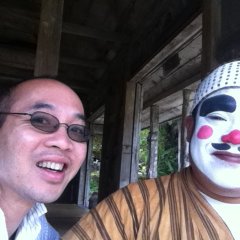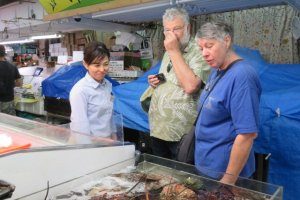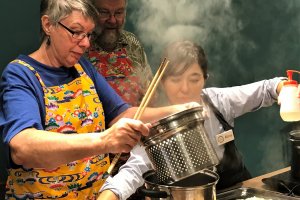Since the Fifteenth Century, merchants and ambassadors have made their way to the shores of the Ryukyu Islands, lured by the magic potion for longevity.
It may take years to unravel the Champulu of philosophies and traditions that have made the Ryukyu kingdom a sanctuary for wellness, but now you can do that in a few hours with a cooking and culture class.
Many visitors have recommended it as a great way to spend your first day in Naha, drinking deep from the well of history, culture and the Okinawan way of life. With a number of cooking classes that have recently blossomed in Okinawa, the question is, which cooking class is best for me? Here are two of the best.
Taste of Okinawa
The bewitching strumming of the Okinawan banjo, calling you home with its timeless sounds of peace and thankfulness. The kaleidoscope of aromas from lands far and near, expertly combined, balancing yin and yang, playing tribute to Okinawa's ties to Eastern philosophies as a centre of culture and trading exchange on the maritime Silk Route. The metronome like rhythm of cutting dough into soba noodles, lulling me into state of meditation. Learning from Rina at this hands-on cooking class feels more like a wellness studio or a beer garden. Like other cooking schools featured in JapanTravel, all the ingredients are prepared in advance, leaving just enough for you to remember the key steps of each recipe.
Rina our teacher blends the best of her grandmother’s home truths, with formal training gained from Okinawan specialists. It is hard to summarise centuries of wisdom into a half day cooking class, but the Taste of Okinawa distils the best parts, without you having to go farm and experience the cycle of the seasons, let alone grinding the grain for soba.
Most participants are from the United States, Germany or Hong Kong, so you don’t need a word of Japanese to understand and participate in this class. Held in a commercial cooking studio which converts to a relaxed drinking hole at night, this cooking class caters for everyone making it suitable for honeymooners and corporate team building sessions alike.
You can select one of the two classes of 3 hours each, one on Soba, one on Champulu. At the end of the two hour cooking session, everyone is invited to gather around the large kitchen table to enjoy the banquet together. The beautiful hand made bowls from nearby Yachiman pottery kilns rounds out our primer into Okinawa culture.
Yonner’s Cooking Class
Like the Taste of Okinawa, Yonner's cooking class begins with a tour of Makishi Markets, a maze of family owned stalls with exotic ingredients like pig’s ears and 200 day fermented and smoked Skipjack Tuna fillets, the red lanterns calling you like an Aladdin’s cave of magic ingredients. After all, we are here to discover the secrets to long life, right? As a key port on the maritime silk route, the Ryukyu people have hand selected spices and produce from Persia to Peru, such was the extent of influences in their cooking repertoire.
Cooking with Yonner is like diving into the heart of a homestay. Her simple and yet practical home kitchen is host to small groups of two to five students, transforming strangers to friends by cooking and enjoying a meal together. It is also a great way to learn Japanese, with intermediate speakers of the language being able to converse deeply with Kazumi Kayo about life in Okinawa, and its changes through her life.




































I find it interesting that mainland Japan also burrows from other cultures (e.g. Portuguese and Korean) into their cuisine, but it is something that needs more digging compared with Okinawa. Retracing the ancient maritime Silk Route, I found it interesting that items like Frankincense has made its way from the Near East to China, and then from the Chinese port of Fuzhou, elements of Chinese Cuisine like pork, making its way to Okinawa. To top it off, there is Thai Indica Rice, making its way into the base ingredient for Awamori.
https://en.japantravel.com/okinawa/curcuma/64162
https://en.japantravel.com/okinawa/the-kitchen-god-of-sefa-utaki/55586
We may forget our connection with nature, being so deeply buried that only great deprivation can bring it to the surface (like the lockdowns that have separated us from each other). The need for us to connect with each other, and with our creator in this tropical garden of Eden that is Okinawa, is woven into the essence of our being.
At the same time, slowing down over a meal with the folk here, is a great way to learn how their culture and cuisine has evolved over time, giving an appeal to audiences from near and far.
https://en.japantravel.com/okinawa/hyakuna-garan-kanro/43445